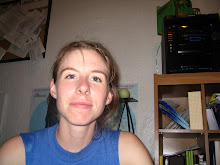skip to main |
skip to sidebar
Learning that the government is actively watching people's activity online and using private information to create profiles is highly distrubing. It's something you know is happening, but don't really think about. I suppose this means everytime you order something online, the company you buy from, now has that information of yours to sell. I was particularly disturbed by the ease that the Total Information Awareness gave to the government to gather information on people without probable cause or a warrent. It's like knowing you have your own personal policeman to monitor everything you do. The other point that popped out at me from the TIA article was the blurb on the name change on the TIA. This seems to be a common practice in government workings. If something becomes controversial, we will just change the name and everything will be fine. The web site said the program was no longer being funded; I wonder if that means the datamining was turning out to be as useful as was hoped or if the project has just gone underground. I'm glad No Place to Hide was written because now I dont feel quite like a conspiracy theorist. I have long though that the key tags for stores and the On Star programs were just ways to keep tabs on our movements. Someone with a cell phone, an email address, a GM and a Grocery key tag is all set to be watched. I understand that this can be a great way to find potential threats, but it is such an invasion of privacy. And we thought Big Brother was going to come in through the TV. Who knows when everyone switches to HD?I found it ironic that the YouTube video had been taken down due to a pending copyright issue with Viacom.This week I commented on Maggie's blog and Miquel's blog
I enjoyed watching the video from the creator of Wikipedia. It is fascinating that such a useful encyclopedia can be created so chaotically. I'm glad too, that he addressed many of the beliefs about Wikipedia and its lack of credibility. I think that many people use Wikipedia, but then say they wouldn't recommend it for scholarly work. In reality, encyclopedias are never an acceptable source of information as a citation. They are where you start to get a general idea on a subject and then do the actual research from there. The added benefit of Wikipedia is the links it has to other 'legitimate' works. One of the libraries I worked at created a wiki for the employee handbook. That way things could be updated and changed immediately, instead of being 2-3, 5 years outdated. It was nice too because anyone could access it and using the side bar you could find what you wanted relatively easy. The down side was you had to be online to be able to see the handbook. Learning the history of blogs and how they are used in the library setting expanded my knowledge of their use. I had known of using blogs for announcements, but using them for communication between staff was new. I like the idea of a reference blog. It seems practical and easy to use. The self filing system would be very useful. That has always been a concern to me about blogs. They are not so easy to search because the page goes on forever and they are only archived by date. I'm glad we read the article of social tagging because I didn't know much about it. I had heard the term, but didn't really know how it is used. It makes sense to me to have a location where all of your links are kept. I had not started to use my bookmarks until recently, but I could see how this could get filled up relatively quickly. I have to actually see how a site like del.icio.us works, but I'm curious to find out. This week I commented on Jabari's blog and Eric's blog
